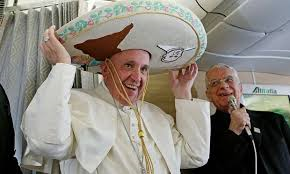
Lessons from Chiapas and Ciudad Juarez
Outside Mexico itself, the United States is home to the largest Mexican community in the world. More than one in 10 Americans count Mexico as their country of origin or are of Mexican descent.
Yet we have an equivocal relationship with Mexicans in our midst and with their home country. We’re OK with them fixing our roofs or washing our restaurant dishes but can’t seem to bring ourselves to see them as equals, or, for those of us who profess faith, as brothers and sisters.
I recall that when I was growing up, many Mexicans declined to identify themselves as such, instead saying that they were “Spanish.” Faced with indifference or hostility, they had little sense of self-worth. That may have improved, but the attitude of many Americans appears to be changing at a snail’s pace.
That’s one reason I was so moved by Pope Francis’ recent visit to Mexico. I know, I write a lot about the Pope, and I hope that non-Catholic readers of this blog will understand. Polls show that many Americans have grown tired of coverage of his travels and homilies, but I believe him to be a prophet of our time – a leader who tells it like it is, practices what he preaches and who reaches out to the people about whom Jesus showed the most compassion.
Guided by Priorities
You could tell what was important to the Pope in his visit to Mexico by where he went, specifically by his trips to Chiapas, Morelia and Juarez. He was courteous with Mexico’s president and government officials in Mexico City, but, guided by his priorities as pope, he was obviously more enthusiastic about visiting the marginalized, the people whom he describes as society’s throwaways.
That included the indigenous people of Chiapas, the victims and perpetrators of drug violence in Morelia and the prisoners and immigrants in Ciudad Juarez.
First, about what he had to say to Mexico’s political and religious leaders in Mexico City. “Make this blessed Mexican nation a land of opportunity,” he urged them, “…where it’s not necessary to emigrate to dream, where it’s not necessary to be exploited to work.
“…Every time we seek the road of privilege or the benefit of the few to the detriment of the good of all, sooner or later life in society becomes a fertile land for corruption, drug trafficking, the exclusion of diverse cultures, violence, including the trafficking in people, kidnapping and death.”
In Mexico’s southern-most state of Chiapas, one of Mexico’s poorest where an estimated third of the population is indigenous, the pope again spoke out for the marginalized and dispossessed, expressing remorse for the way indigenous people have been exploited.
“Often, in a systematic and structural way, your people have been poorly understood and excluded from society,” he told the thousands gathered for a Mass. …How good it would be for us to make an examination of conscience and learn to say, ‘Forgive us!’”
In Morelia, which has seen a big share of drug violence, he admonished officials, residents and drug-mafia members to break out of their molds.
“What temptations can come from environments very often dominated by violence, corruption and trafficking in drugs? …Confronted by this reality we are tempted to adopt one of Satan’s preferred weapons, resignation.”
Sad State of Penal System
And at a prison in Ciudad Juarez, on the border with the United States he lamented the sad state of the penal system on both sides of the border.
“Sometimes it seems that prisons appear to be incapable of pursuing a process of rehabilitation for people who commit crimes. …The resolution of security problems isn’t exhausted by jailing people.” He listened to a female inmate’s moving account of life in prison and repeated what she was told by a friend after her incarceration, that she shouldn’t ask why she’s in prison but what purpose she could achieve while there.
Also in Ciudad Juarez, he said that ordinary people become “cannon fodder, persecuted and threatened when they try to flee the spiral of violence and the hell of drugs,” and specifically mourned the plight of the “many women unjustly robbed of their lives” by drug violence.
“Let us together ask our God for the gift of conversion, the gift of tears,” he said. “Let us ask him to give us open hearts … open to his call heard in the suffering faces of countless men and women. No more death! No more exploitation! There is still time to change, there is still a way out and a chance, time to implore the mercy of God.”

